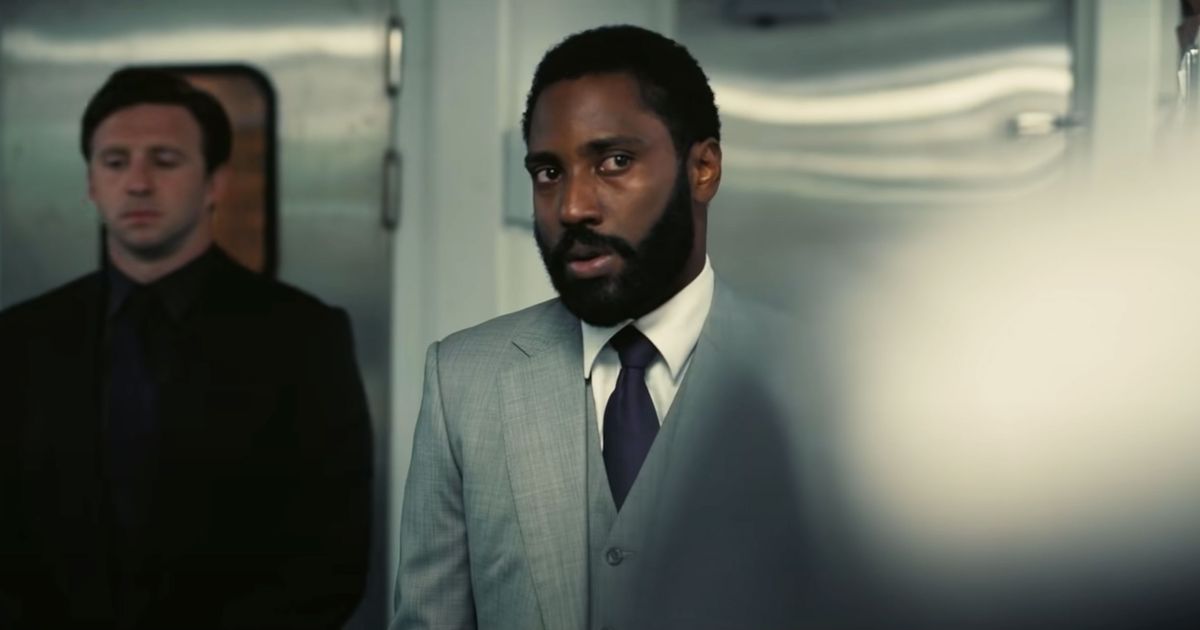
Tenet already had many eyes upon its release, being the latest entry from legendary director Christopher Nolan and a big summer blockbuster. But as we are all aware, 2020 has been the year of curveballs and one was thrown straight at Tenet with the fallout of the coronavirus and resulting shutdowns and quarantining around the globe. The subsequent delay of almost the entire movie release slate left movie theaters in the dark about reopening. At the insistence of its director Tenet served as the guinea pig on the viability of theatrical releases during the age of COVID-19, becoming the first major release in the midst of the pandemic. With all of the focus on this film, does the quality of film stand up to the scrutiny?
Tenet follows a CIA agent with the moniker “The Protagonist” (John David Washington) after he dies following an operation in Ukraine once his cover is blown. It turns out, the operation was just a test to gauge his strength and loyalty so that he can be recruited for a mysterious mission to prevent the end of the world. The Protagonist is given little information other a code word, Tenet, that will reveal allies and enemies alike. While trying to uncover the plot, he meets a mysterious contact named Neil (Robert Pattinson) that helps him track down Russian oligarch Andrei Sator (Kenneth Branagh) and his wife Kat (Elizabeth Debicki). The Protagonist must try to balance the intertwined relationships and complicated relationship with entropy that allows both people and objects to travel backward through time.
In the moments following the film’s opening, a scientist tells The Protagonist “Try not to understand it. Just feel it.” While the piece of advice was ostensibly meant for one character for another, it’s also immediately apparent to astute viewers that Christopher Nolan is speaking directly to the audience about the extremely dense, time bending rules contained within Tenet. Nolan critics have accused his successful filmography of lacking feeling over the years, a criticism that this reviewer has personally argued does not stand up in the face of Nolan films like Interstellar or Dunkirk. While Nolan’s technical prowess as a director and the complicated, non-linear plot lines are always at the forefront, he has still traditionally managed to create characters with relationships that allow viewers to become invested in their fates. With this in mind, Tenet is the first time this mode of criticism feels apt for one of his films.
John David Washington and Robert Pattinson display a wonderful onscreen chemistry that develops believably and naturally, but there’s no emotional pull within either of their stories that draws you toward the characters completely. Kat’s storyline involving her broken marriage, love for her son, and desperate need to break free of her abusive husband is clearly meant to be that emotional tie, but it falls flat with the exception of one shot near the film’s end that represents a clever callback made possible by the film’s time bending premise. The romance between Kat and The Protagonist never really connects either or evokes any type of feeling by the end of the film. The lack of emotional pull in the film could be due to the time spent trying to follow the complicated time theory, but whatever the explanation Tenet feels like it has a lack of soul that is only exacerbated by how technically proficient the film is as a whole.
While Tenet may struggle with establishing a truly engaging story with characters audiences will make investments in, Nolan’s prowess as a technical director is fully present within this film. The complicated concept of time in Tenet allows for the creation of thrilling action sequences, particularly the film’s car chase scenes that are fast paced and feature creative juxtapositions of time with one part moving forward while other elements go backward from a future that has yet to happen. Action has historically been a weak spot for Nolan, but the scenes here are well choreographed and engrossing.
Tenet is a complicated spy thriller that has its moments and highlights director Christopher Nolan’s legendary strengths, but for the first time makes the flaws in his storytelling ability apparent to more than just the most stringent critics. The script offers multiple explanations of the complicated theory on time within the film in the form of character exposition that is well paced and doesn’t feel out of place, but fully understanding it will require multiple viewings, which many viewers may not feel motivated to make because of Tenet’s inability to create any emotional ties between the audience and its characters or their relationships. John David Washington and Robert Pattinson are able to create a believable, engaging rapport between their characters that registers the highest on the emotional pull scale in the film. Kenneth Branagh serves as the film’s villain and does a decent enough job, but at times can teeter on the edge of over-the-top in terms of his believability as the heavy, calling to mind some of the old Bond villains.
There have been many rumors about Christopher Nolan’s dream to one day direct a James Bond film. Tenet may have been his proof of concept and while it shows he can create a technically proficient action spy thriller, there are still some kinks to work out before he’s given the keys to that Aston Martin.
Image: Warner Bros.

